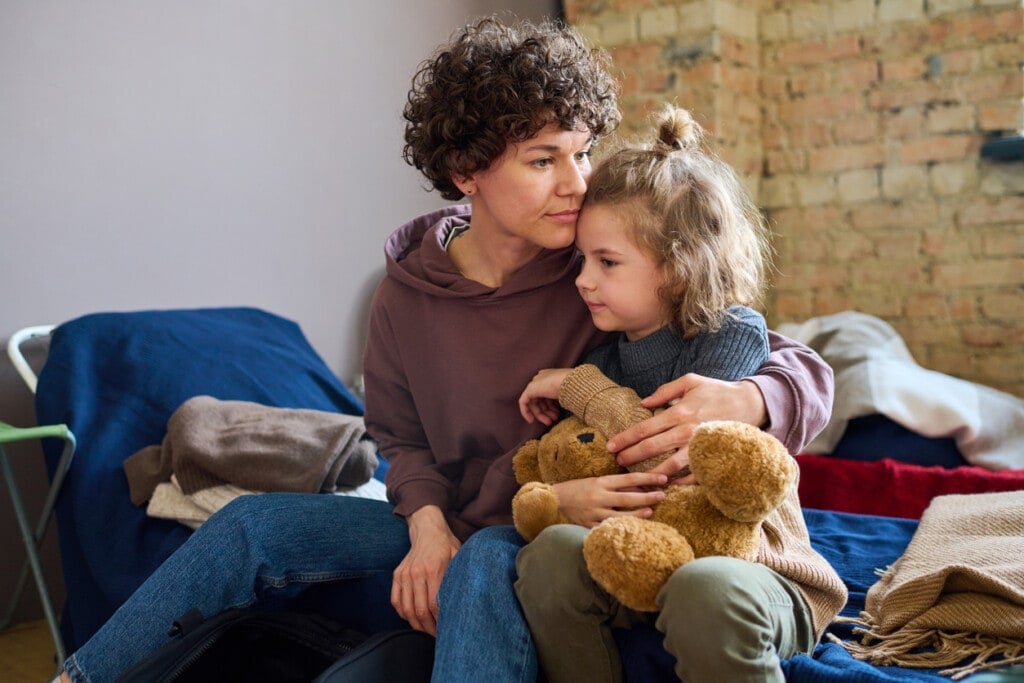Our children’s relationships shape how they see and experience the world around them. These relationships allow them to express themselves and help them learn how to communicate, express emotions and develop social skills. The parent-child relationship is integral to their development because it is not only their first critical relationship but also creates a template for their future relationships and perception of the world.1
What Does a Healthy Parent-Child Relationship Look Like?
If you are attuned to your child, respond warmly, and are receptive to their needs, your child will experience safety and security, increasing their attachment to you. They learn about communication, emotions, and expectations for how to engage with other people. When you respond in an attentive and nurturing way, your child is likely to feel more confident in exploring their world, which supports their development. In addition, they also learn that you are there for them and can support them if things go wrong or they need you. You become a safe base they can return to when things are challenging. These are all hallmarks of a strong and healthy parent-child relationship.1,2
12 Tips to Build a Healthy Parent-Child Relationship
Here are 12 tips to help you build a healthy parent-child relationship with your little ones.2,3,4
1. Play Peekaboo
This is a game you have probably played or will play at some point with your baby, but did you realize it’s a great activity to bond? You hide behind your hands, wait for a few moments, and pop out, calling “peekaboo,” and your baby coos or calls out happily in surprise, so you repeat the activity. You are showing them how to take turns in conversation without being aware of it, and you are also responding intuitively to your baby’s response.
They learn that if they laugh or engage in certain behaviors, you will keep playing with them, and in turn, when you respond to them makes them feel happy and connected to you. This further builds your attachment and bond with them. Peekaboo is also great for motor skills like reaching, language, and cognitive skill-building. When you disappear, they are learning you will return. This is an essential skill for later, called object permanence, when they understand that when things disappear, they still exist and don’t disappear forever.
2. Narrate Play
Notice what your child is doing, comment on it, and encourage them or demonstrate curiosity by saying things like, “I can see you are playing with your blocks; you are stacking them; I wonder what you are building?” Not only are you helping your child learn new words, but you are also demonstrating your interest in what your child is doing. This will hold you in good stead as they grow older. If they feel we are interested in the little things, they will share the big stuff with us when the time comes.
3. Tune Into Their Feelings
Watch your child’s behavior and listen to what they are saying. Share your thoughts about their feelings, saying, “It looks like you are mad all the blocks fell over.” Not only does this type of communication help your child make sense of their feelings (which can be confusing for them), but it also shows you are attuned and understand them and how they feel. This goes a long way to building a good bond and a healthy relationship with your child as they learn they can trust you to “hold” their big feelings.
4. Let Your Child Take the Lead
This is essential for all children in a healthy parent-child relationship. Give them some responsibility (age-appropriate levels) and an opportunity to take charge. It could be about picking their clothes, planning a family dinner, or deciding on a recipe you can cook together. When you let your child take charge, they build confidence in themselves because you demonstrate your confidence in them. They also blossom from the trust you are giving them to make choices.
5. Spend Quality Time with Them
This one might feel like a no-brainer, but it’s vital in healthy parent-child relationships. Time together is when you get to know each other better, like your thoughts, feelings, and interests, and it allows you to communicate positivity and connection with hugs, conversation, and undivided attention. Remember, it’s about the quality of the time, not the quantity.
6. Stick to Your Promises
This way, your child learns to trust what you say, and it demonstrates respect but also that you value them.
7. Listen Without Judgment
This could be respecting their feelings or opinions even if you disagree. When you listen without getting upset or judging your child, you send them the message that you can support them regardless of your “stuff.” This helps them become more confident and trusting to come to you with challenges and issues.
8. Be Clear and Firm with Boundaries
Kids don’t always like boundaries but need them, especially in a healthy parent-child relationship. A boundary is a clear rule or expectation you set and adhere to. When you are clear and consistent, your child understands what needs to happen in certain situations and what to expect from you. This helps them feel safe and secure within their relationship with you.
9. Notice Their Strengths
It’s easy to pick up on or comment on the challenges and issues – socks left in the hallway again, tipping their food off their plate, etc. Pay attention to when they do well or give them opportunities to demonstrate their strengths. For example, play a game they are good at and tell them when you notice they have been trying hard at something.
10. Provide Them Warmth
Our children learn and develop when they feel trusted, safe, understood, and loved. Warmth is an atmosphere where your child feels emotional and physical security. You can do this by allowing and accepting when they make mistakes, encouraging them, comforting them when they are sad, scared, disappointed, etc., supporting them when they feel challenged, and providing gentle, positive touch when invited by your child to demonstrate consent.
11. Give Them Structure
When we don’t provide rules and structure, our kids can get confused or anxious when they try to figure things out for themselves or get punished if they make a mistake. Children learn best and feel confident when they have the correct information, rules, and guidelines that help them make decisions and succeed. They then can feel confident within their relationship with you and know where they stand with you.
12. Apologize to Them
We often expect our kids to apologize, but we must reciprocate. Not only to show our kids that there is no shame in apologizing but also that we respect them equally and will apologize when we are wrong.
Loving, warm, and respectful interactions with your child build their confidence, communication, and social skills and increase their trust, safety, and security in your parent-child relationship. These building blocks for a healthy parent-child relationship will help your child develop a solid template to build healthy relationships with others.































